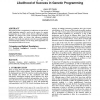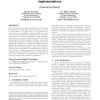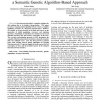331 search results - page 2 / 67 » Initial Population for Genetic Algorithms: A Metric Approach |
CSMR
2003
IEEE
13 years 10 months ago
2003
IEEE
There may be several reasons to reduce a software system to its bare bone removing the extra fat introduced during development or evolution. Porting the software system on embedde...
GECCO
2005
Springer
13 years 10 months ago
2005
Springer
This paper presents a comprehensive, multivariate account of how initial population material is used over the course of a genetic programming run as while various factors influenc...
SIGADA
2004
Springer
13 years 10 months ago
2004
Springer
Genetic Algorithms provide computational procedures that are modeled on natural genetic system mechanics, whereby a coded solution is “evolved” from a set of potential solutio...
ITRE
2005
IEEE
13 years 10 months ago
2005
IEEE
A Bayesian network model is a popular technique for data mining due to its intuitive interpretation. This paper presents a semantic genetic algorithm (SGA) to learn a complete qual...
GECCO
2005
Springer
13 years 10 months ago
2005
Springer
Resource-Limited Genetic Programming is a bloat control technique that imposes a single limit on the total amount of resources available to the entire population, where resources ...




